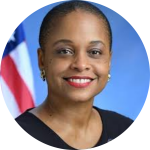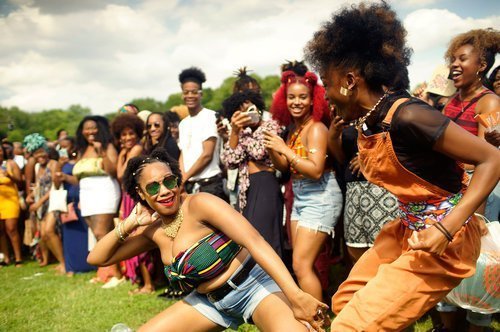In light of the recently passed legislation, the Create a Respectful and Open Workplace for Natural hair (CROWN) Act to combat hair discrimination in workspaces, Assemblymember Tremaine Wright (D-Bedford-Stuyvesant) last night organized an info-session panel to talk the history and psychology of hair bias against people of color.
Medgar Evers College, at the Center for Law and Social Justice, 1650 Bedford Avenue, hosted the all-black women panel to discuss eliminating natural hair bias in workforce environments and conversations towards educating young people of color on hair and race politics.

“As a black woman who prioritizes equity, and has worn my natural for 17 years, this bill is deeply personal for me. While chatting with racial and gender equity champion Adjoa B. Asamoah about the longstanding and problematic practice of hair discrimination, I recalled the action Congresswoman Marcia Fudge took during her tenure as Congressional Black Caucus Chair to confront new rules the U.S Army proposed to ban hairstyles that would disproportionately impact black women,” said Wright.
“I determined a legislative fix was in order, and decided I’d carry the CROWN Act in New York. I am beyond proud to have done so, and for New York to be the first state to have had this historic bill passed in both chambers,” she added.
The CROWN Act amends the government and education code to define race as inclusive traits historically associated with race, including hair texture and hairstyles. This notably proves to be progressive against a multi-generational form of injustice against afro-textured hair that has been deemed “nappy”, “kinky”, and “sloppy,” panelists said.
In the 15th and 16th century, the Atlantic slave traders coerced slaves to shave their heads to erase their African heritage and ties to their culture, according to the Austin History Center, a division of the Austin Texas Public Library.
As Eurocentrism advanced in the antebellum era, many African-American women adopted harmful practices to straighten their hair, including butter, kerosene, and lye. This yearning for straight hair lead to the black-coined term, “good hair,” according to the Chirs Rock documentary, Good Hair.

“We get out of the womb and everyone thinks about the texture of our hair,” commented Professor Wendy Greene, a leading US anti-discrimination lawyer and panelist. “CROWN brings a new level of awareness to people all over the world about the history of hair discrimination.”
Discussion during the forum centered around discrimination against hair texture and hairstyling in the black community how it psychologically instilled a survival mechanism where those who walk outside in “fros” and “locks” get a heavy amount of shame from those in their own community. Eurocentrism and desire for straight hair have been far-long indoctrinated in a great number of Afrocentric values, even in the products we consume and buy, audience members noted.
Panelist Dr. Gillian Scott-Ward, a filmmaker and clinical psychologist talked about the famous Mamie and Kenneth Clark 1940s study, a “doll test,” where African-American children were presented two dolls- one white and one black, to see the effects of segregation on the younger generation. And in fact, the children preferred the white doll.
“Healing is the number one thing,” said Scott-Ward. “We haven’t done the psychological work to prepare for healing and reparations”.
Scott-Ward directed a documentary, Back to Natural, to reveal the truths and politics around hair and racial identity that premiered on REVOLT TV.
“We need to interrogate the politics of desire, lust, and attraction,” said Panelist Lurie Daniel Favors, an attorney for racial and social justice. “Everything we love is programmed from white supremacy.”
Earlier in February, an Upper East Side salon faced major criticism for forcing their black employees to avoid wearing hairstyles like afros and boxbraids, a week after the New York City’s Human Rights Commission ruled against natural hairstyle discrimination.
The forum comes as the city next week will host CURLFEST, the largest natural beauty festival in America, and is 100% owned by Black women. Created in 2014 by Curly Girl Collective, the annual festival has attracted over 75,000 attendees from around the world.
CURLFEST is slated for Saturday, July 27 at Randall’s Island. For more information log onto https://www.curlfest.com/.










